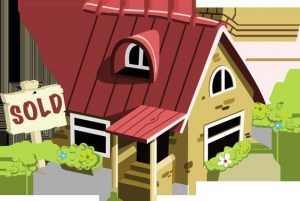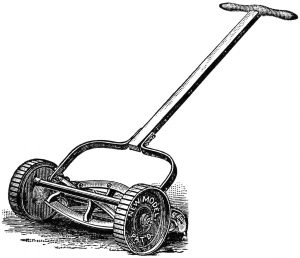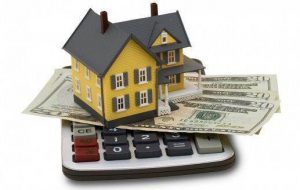Rightsizing – Downsizing Your Home to Upsize Your Life
by Andrea Bulen
 Chad and I bought our first home in 2000. It was almost 100 years old, 1000 square feet, had a lovely deck and fenced in back yard that came with an old-fashioned manual/push reel mower. It took us about 15 minutes to mow the whole yard, 1 hour to rake leaves in the fall, and 5 minutes to shovel the sidewalk in the winter. We could clean the entire house in 1 hour if we were both working together and Chad could fix almost anything in the house. We bought a how-to book about home improvements from Home Depot and together repaired and upgraded most of the house by ourselves. Our mortgage, including property taxes and insurance was less than $800/month (and this was back when we locked in at the very low rate of 7%). I LOVED that house.
Chad and I bought our first home in 2000. It was almost 100 years old, 1000 square feet, had a lovely deck and fenced in back yard that came with an old-fashioned manual/push reel mower. It took us about 15 minutes to mow the whole yard, 1 hour to rake leaves in the fall, and 5 minutes to shovel the sidewalk in the winter. We could clean the entire house in 1 hour if we were both working together and Chad could fix almost anything in the house. We bought a how-to book about home improvements from Home Depot and together repaired and upgraded most of the house by ourselves. Our mortgage, including property taxes and insurance was less than $800/month (and this was back when we locked in at the very low rate of 7%). I LOVED that house.
Like many, we moved on to a bigger home after we had children. As the size of our home increased, so have our expenses. Our mortgage, property taxes and insurance have gone up proportionately with the size of the house. We have more space to fill with furniture and somehow we can no longer count on our trusty Home Depot book to walk us through home repairs. Did I mention that we have a two acre wooded lot (Chad's dream) with about thirty 100-year-old Oak trees?
 Beautiful? Yes. Low maintenance? No! It takes two full weekends in the fall to rake (if we get the leaves up before the snow flies) and mowing is the better part of a morning. Oh, and we can't use our old-fashioned (and free) reel mower anymore. Who knew how expensive riding mowers with bagging systems can be?
Beautiful? Yes. Low maintenance? No! It takes two full weekends in the fall to rake (if we get the leaves up before the snow flies) and mowing is the better part of a morning. Oh, and we can't use our old-fashioned (and free) reel mower anymore. Who knew how expensive riding mowers with bagging systems can be?
The total of our current home related expense accounts for a lot more of our budget than our first home did; and less of those expenses are under our control. Not only is this house more expensive, it also takes a lot more time and energy to maintain. We still have the energy and interest to work on the home, but time is harder to come by with two careers and three kids.
I love our current home; but it has gotten me thinking what our next home may look like. Not only will I pay attention to the time and energy it takes to maintain; but I'll be realistic about the fixed expenses associated with owning the home. The lower our fixed expenses are, the more we can spend in other areas.
This starts our two-month series on the topic of "rightsizing."
Rightsizing is an alternative name for downsizing your primary residence. We hear this term a lot in our industry as retirees move from the home they've raised their family in to a home more well-suited for them at this stage of life. People decide to rightsize for many different reasons, including reducing expenses, tapping into home equity, reducing/eliminating home maintenance tasks, or moving into a community that they are more connected with.
Reducing Expenses:
How much you spend each year has a dramatic impact on your financial plan. Housing costs are often the largest category of expenses and are proportionately related to the size of your home. Annual housing expenses can range from 2-4% of your home's value. Being able to reduce expenses, or at least have more control over expenses, allows your financial plan to work better for you. Here are things to consider as you look for your next home:
- In Wisconsin our property taxes can range from 1 to 3% of your home's value. Pay attention to the property taxes. Don't forget to build that cost into your expenses. How much could you save each year by buying a slightly smaller home? or one in an area with lower property taxes?
- Don't forget homeowner's insurance. Typically, the size of your home will have a direct impact how much you pay in homeowner's insurance.
- Of course, utility costs are also relative to the size of your home.
- How much furniture you need will depend on the size of your home.
- Home maintenance - Plan to spend 1% per year on general home maintenance; and that doesn't count major repairs or upgrades.
- Hiring professionals for snow removal, cleaning, landscaping.

Do a little exercise: add up what you are paying for these services now and calculate what they may be if you reduced the size of your home by 30%.
For those of you who have been through our financial planning process, you know that reducing your expenses by even $5000/year can extend your retirement funds by several years or several hundred thousand dollars over a 30 year retirement.
In addition to reducing your future expenses, downsizing may also free up some of the equity you have in your home and create liquidity. Think of it this way: If you were able to free up $100,000 of cash from your home equity, that could fund a nice travel budget for 10 years. How would you feel about a smaller home if you knew your travel was covered for the next 10 years?
 Even if your financial plan is well on track with your current expenses, there are other non-financial benefits to downsizing as well. At some point people stop enjoying working out in the yard, painting... and who really likes to shovel a long driveway? The time you save can be spent doing something more rewarding.
Even if your financial plan is well on track with your current expenses, there are other non-financial benefits to downsizing as well. At some point people stop enjoying working out in the yard, painting... and who really likes to shovel a long driveway? The time you save can be spent doing something more rewarding.
Finally, as you transition into retirement you may not want to be in the same subdivision that you lived in when you were in your 30s and 40s. You may like to move away from the families with small children, bikes on the sidewalks and baseballs through your windows. You may prefer quiet neighbors, walking paths and community centers, or easy access to theaters, arts, shopping and dining.
Making the decision to move is easier said than done and involves some difficult decisions and a lot of work. Do you stay nearby or leave town? Do you buy a smaller home or a condominium? Do you even buy at all? Would renting be a better fit for you? We'll explore some of these topics in next month's View from the Lake.
-Andrea
